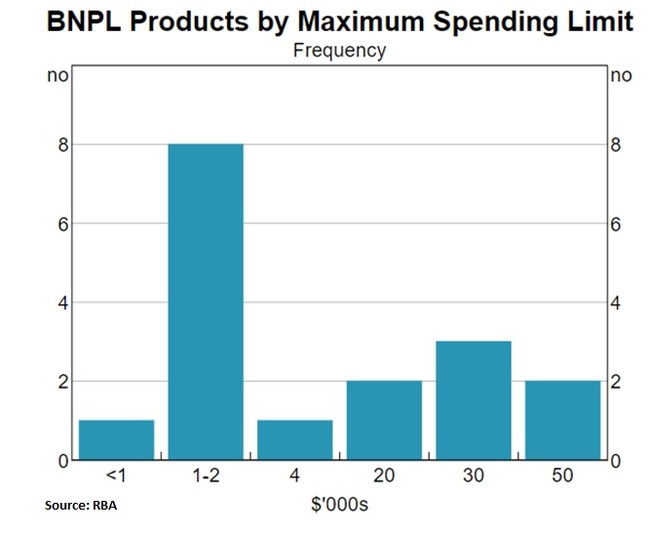Buy now, pay later regulation on US agenda, given data harvesting, consumer protections risks
The regulatory net is closing on buy now, pay later players in Australia and around the world, after the US signalled it will take action.

The regulatory net is closing on buy now, pay later players around the world, after the US signalled it will take action and domestically Treasury finalises an issues paper to examine potential reforms.
The US Consumer Financial Protection Bureau late last week published a damning report on the buy now, pay later sector following an inquiry that started in December to gain further industry data and insights. The report highlighted a string of issues in the industry including how it leverages customer data and promotes further spending.
As a result of the report’s findings, the CFPB said it planned to address “discrete consumer harms” across areas such as debt accumulation and over-extension, data harvesting and “inconsistent consumer protections” in the US buy now, pay later sector.
“The CFPB will identify potential interpretative guidance or rules to issue with the goal of ensuring that buy now, pay later lenders adhere to many of the baseline protections that Congress has already established for credit cards,” the agency said. “As part of this review, the agency will also ensure buy now, pay later lenders, just like credit card companies, are subjected to appropriate supervisory examinations.”
The agency flagged that it wants buy now, pay later players to develop accurate credit reporting practices.
In Australia, an issues paper canvassing the options for buy now, pay later regulation is scheduled to lob in October.
The point person at Treasury on the paper is understood to be director Daniel McAuliffe and players in the sector have been asked to provide the department with data to assist it in getting a fuller picture of the industry.
Treasury has been undertaking the broad review of the sector to decide how to best bring it within credit regulation, including garnering feedback from industry roundtables and hosting meetings with key players.
Other markets including the UK are also imposing tighter regulation on buy now, pay later players.

Cyan Investment Management director Dean Fergie – whose firm sold out of Afterpay in late 2019 and Sezzle in August 2020 – noted bumper valuations and looming regulatory risks formed part of those decisions.
“It was a combination of the fact that this was a newish industry that seemed to be slipping through a very narrow gap of consumer credit being offered somewhat unregulated, and we didn’t think that could continue,” said Mr Fergie.
“As they have become successful and quite widespread in terms of consumer lending we thought that regulatory issue was always going to be a risk, which has come to fruition. Secondly, for us, it just came down to valuation.”
The US report outlined that while the buy now, pay later payments option was growing quickly and provided some consumers more flexibility, there were a spate of concerns.
The report focused on five providers of pay-in-four instalment products spanning Affirm, Afterpay, Klarna, PayPal and Zip, which wrote loans of more than $US24bn ($36bn) last year, an almost tenfold increase from 2019.
“Buy now, pay later firms are harvesting and leveraging our data to grow revenue outside of their core lending business in ways that we do not see with other lending products. While credit card companies are also doing more with our data, buy now, pay later is at a different level,” said CFPB director Rohit Chopra.
“Through their proprietary interfaces, buy now, pay later firms can use our data to determine what products we see through paid product placement. This opens up the door to digital dark patterns and even the potential to price products based on our behaviour.”
The CFPB aims to identify data surveillance practices that buy now, pay later players should avoid. The report also delved into the potential for consumers to get into trouble via accrued debts if they took out multiple buy now pay later accounts, which are often not approved through credit checks.
The report found 10.5 per cent of unique users were charged at least one late fee in 2021, up from 7.8 per cent in 2020. It showed an increasing use of buy now, pay later for everyday purchases such as petrol, groceries, and energy bills which amounted to $US229.2m last year, from $US42.9m in 2020.
“Because most buy now, pay later lenders do not currently furnish data to the major credit reporting companies, both buy now, pay later and other lenders are unaware of the borrower’s current liabilities,” the report said.
The instalment payments sector faces pressure from increasing interest rates, which jack up funding costs, while consumers are grappling with a spike in the cost of living over the past year.
Last month, Financial Services Minister Stephen Jones outlined that impending regulation of the local buy now, pay later sector would centre on creating a “level playing field” and not stifling competition.
Mr Jones has previously flagged he wants buy now pay later services treated as a type of loan product.
Mr Fergie said regulation may bode well for the sector given valuations had crashed.
“If there was some form of regulation it would give the market an idea of the true framework and you could make your investment decision based on that.”
The UK Treasury outlined plans to require BNPL operators to carry out affordability checks on customers and ensure advertisements are not misleading.
A consultation on draft UK legislation will be released toward the end of 2022, followed by secondary legislation by mid-2023.






To join the conversation, please log in. Don't have an account? Register
Join the conversation, you are commenting as Logout